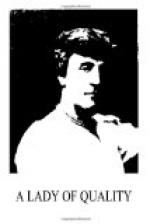And while he, poor gentleman, knelt, kissing her hand with adoring humbleness, she, under the splendour of her crown of roses, gazed down at his grey-sprinkled head with her great steady shining orbs, as if gazing at some almost uncomprehended piteous wonder.
In less than an hour the whole assemblage knew of the event and talked of it. Young men looked daggers at Dunstanwolde and at each other; and older men wore glum or envious faces. Women told each other ’twas as they had known it would be, or ’twas a wonder that at last it had come about. Upon the arm of her lord that was to be, Mistress Clorinda passed from room to room like a royal bride.
As she made her first turn of the ballroom, all eyes upon her, her beauty blazing at its highest, Sir John Oxon entered and stood at the door. He wore his gallant air, and smiled as ever; and when she drew near him he bowed low, and she stopped, and bent lower in a curtsey sweeping the ground.
’Twas but in the next room her lord led her to a gentleman who stood with a sort of court about him. It was the tall stranger, with the fair periwig, and the orders glittering on his breast—the one who had started at sight of her as she had reached the landing of the stairs. He held still in his hand a broken red rose, and when his eye fell on her crown the colour mounted to his cheek.
“My honoured kinsman, his Grace the Duke of Osmonde,” said her affianced lord. “Your Grace—it is this lady who is to do me the great honour of becoming my Lady Dunstanwolde.”
And as the deep, tawny brown eye of the man bending before her flashed into her own, for the first time in her life Mistress Clorinda’s lids fell, and as she swept her curtsey of stately obeisance her heart struck like a hammer against her side.
CHAPTER IX—“I give to him the thing he craves with all his soul—myself”
In a month she was the Countess of Dunstanwolde, and reigned in her lord’s great town house with a retinue of servants, her powdered lackeys among the tallest, her liveries and equipages the richest the world of fashion knew. She was presented at the Court, blazing with the Dunstanwolde jewels, and even with others her bridegroom had bought in his passionate desire to heap upon her the magnificence which became her so well. From the hour she knelt to kiss the hand of royalty she set the town on fire. It seemed to have been ordained by Fate that her passage through this world should be always the triumphant passage of a conqueror. As when a baby she had ruled the servants’ hall, the kennel, and the grooms’ quarters, later her father and his boisterous friends, and from her fifteenth birthday the whole hunting shire she lived in, so she held her sway in the great world, as did no other lady of her rank or any higher. Those of her age seemed but girls yet by her side, whether married or unmarried, and howsoever trained to modish ways.




